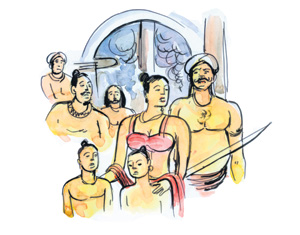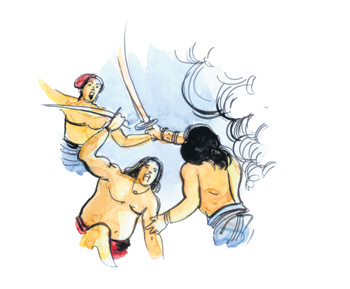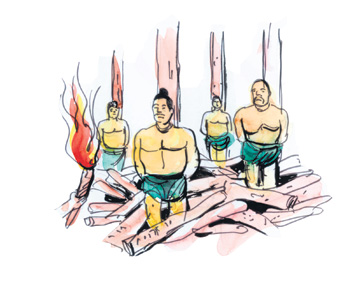
| This article is part of a continuing series on the 'Mahavamsa,' the recorded chronicle of Sri Lankan history The rebellion of the mercenaries
1. King Vijayabahu's anger knew no bounds. The Chola envoys who were quite frightened at the king's challenge, did not utter a word. They remained quiet. The king sent his men and got down female garments. He got the Chola envoys dressed in these garments, boarded them on a ship and made them sail away to the Chola country. He strengthened his army and went to Anuradhapura with them. He trained two battalions, with the idea of invading the Chola country. 2. These two armies were placed under two commanders. He was quite brisk in getting things ready for an invasion. With the intention of adding more strength to the two armies, he enrolled a group of mercenaries too. It did not strike the king that he was employing Chola soldiers. 3. These mercenaries would never go against their kith and kin and their home country. But they accepted the king's orders and remained quiet. Now, King Vijayabahu sent one army under its commander, to Mativalatota. The other was sent to Matota. The mercenaries who were serving in this army began to revolt. The Chola subjects, who were residing in the country, also joined the rebels. This made the rebels gain more power.
4. The Sinhala soldiers were unable to suppress this uprising. Chola power was so great, that they succeeded in killing the two Sinhala commanders, who were in charge of the two units. They marched to Polonnaruwa victoriously. As was their practice, they set fire to the villages, on their way. They even killed the cattle, the people owned. Then they entered the city and set fire to the king's palace. 5. Here they arrested King Vijayabahu's youngest sister and her two sons. The next step of the rebels was to plunder the houses and temples in the neighbourhood. King Vijayabahu found it extremely difficult to face all these troubles. He lost confidence and became helpless. Unwillingly though, the king thought of fleeing from the scene. He collected all the valuables within his reach and fled. 6. The king stopped at the fortress at Vakirigala in the Kegalle Dissawa. From here he started reorganizing his army. His brother Veerabahu, who was the 'Uparaja' then, joined him. Together with their armies, the two of them marched to Polonnaruwa. They fought a severe battle with the rebels. Though a lot of lives were lost, the two brothers succeeded in suppressing the rebellion.
7. The leaders of the mercenary armies were severely punished. Those who survived, were made to do hard labour. It is difficult to understand why, this king who constantly fought against the Cholas, decided to employ Chola soldiers for his services. It was around 1085 AD that this rebellion broke out. However, the king decided to be on his guard thereafter. He believed that the Cholas may attack at any moment. 8. By about 1100 – 1101 AD, King Vijayabahu organized his army, to fight the Cholas. He had gone to Matota and put up camp there, awaiting an attack by the Cholas. But there is no mention of a reason for such an attack. |
|| Front
Page | News | Editorial | Columns | Sports | Plus | Financial
Times | International | Mirror | TV
Times | Funday
Times|| |
| |
Copyright
2007 Wijeya
Newspapers Ltd.Colombo. Sri Lanka. |


